There was a lot different in the second game of the matchup between the Anaheim Ducks and San Jose Sharks. And yet, in the most meaningful ways, it was the same.
The result, as it was in the series opener, was a Sharks win. In Game 2, the final score was 3-2. The reason for the win was the same. The Sharks kept their poise and the Ducks didn’t.
Even favorable officiating wasn’t enough for the Ducks. The Ducks took liberties on the Sharks which, to be blunt, officials were irresponsible to let go. We’re not talking chippy stuff, but hard elbows to the head and blindside hits; dangerous stuff officials really do need to call. Trips and crosschecks were mostly ignored. Tomas Hertl tripped Ondrej Kase in the opening period, no call. In the third period, Ryan Getzlaf shoved his stick into Joe Pavelski’s skates in front of the Sharks net, but again, no call. Corey Perry’s dangerous hit on Melker Karlsson in the third period is sort which often draws five minute majors. It received a two minute minor.
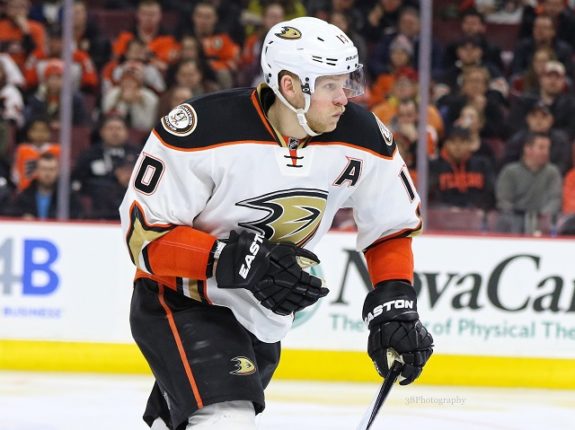
A reasonably called game might have seen the Ducks take a dozen penalties and spend close to half the game with someone in the penalty box (the Sharks would have seen a couple more visits, too). But it wasn’t the case, as the teams combined for only five power plays (three for San Jose). It was almost comical the penalties which were called given what was being let go, and each team wound up with a power play score.
It’s Not Working for Anaheim
Anaheim’s physical game attempts to throw the Sharks off their game. And for the second game in a row, it didn’t. Once again, the Sharks outpoised the Ducks. They outplayed them, too.
Martin Jones has been the better of the two goalies, though the floater he let in in the game’s opening minute was on the soft side. For the rest of the game, indeed for the rest of both games, Jones has been locked in. He made a number of excellent saves in Game 2. To win the series, Anaheim needs John Gibson to be the better goalie and while Gibson was brilliant beginning in the latter part of the second period, he wasn’t quite good enough prior to that point.
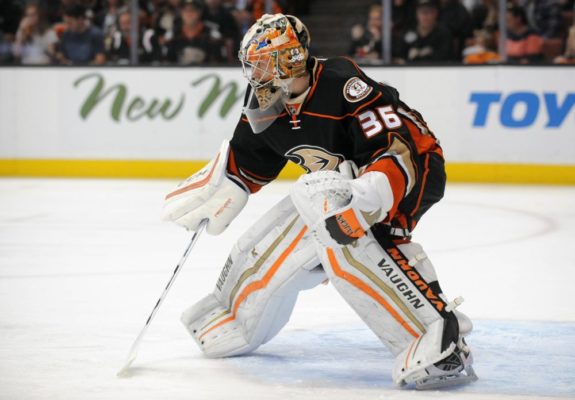
The Sharks haven’t made anything easy for the Ducks. San Jose went over 110 minutes before giving up an odd man rush this series (a 2-on-1 which the Ducks weren’t able to convert). High danger scoring chances are infrequent for the Ducks, while the Sharks seem able to create them more often and cash in when they happen.
The Sharks are also getting contributions from everyone who plays. Eleven of the 18 Sharks skaters have at least one point. Of the other seven, five are at least plus-1. The only two who haven’t scored and are even? Marc-Edouard Vlasic (the team’s ice time leader) and Justin Braun, who’ve done a terrific job of closing down the top Ducks forwards.
Winning the Physical War
The irony in this series, is while the Ducks are far more physical and getting the better of many battles, it is the Sharks who are winning the physical war. Sharks power forward Evander Kane has a pair of goals. Logan Couture’s heavy drive to the net earned another. Hertl’s goal came with a defender draped all over him, and he powered through anyway.
One might think Marcus Sorensen, the smallest player on the Sharks, didn’t score a physical goal. But you’d be wrong. On the play, Eric Fehr’s physical battle near the front of the net allowed Sorensen to slide in underneath Fehr at the side of the net, from where he scored. Only Brent Burns’ goal in the series opener isn’t directly linked to the Sharks physical power forwards.
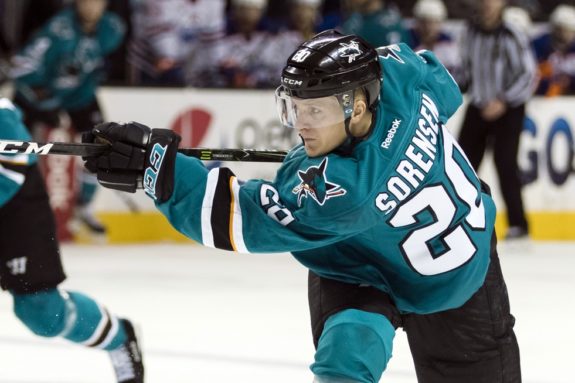
The Sharks have exploited weaknesses in the Anaheim defensive depth. The Ducks fourth line has been almost invisible with their top groups playing heavy minutes. Even as the top units for the Sharks have ‘Corsi For’ ratings well below 50 percent, the bottom groups are well above and they’ve made a difference.
The Shark Tank Awaits
As the series heads north to San Jose with a pair of games at the Shark Tank, it’s up to Anaheim to decide if they can continue to play the same style which has lost them the first two games. The Sharks are simply not going to stop playing their game and it’s a smarter game than Anaheim is playing.
Better officiating will destroy the Ducks chances – the Ducks can’t count on the sort of irresponsible whistle-swallowing which went on in Game 2. They need to make changes or they’ll wind up relying on poor officiating to keep them in the series. Which isn’t the best plan for a team as talented as the Ducks. Even with the officials holding back in Game 2, the Ducks have still been shorthanded nine times in the two games.
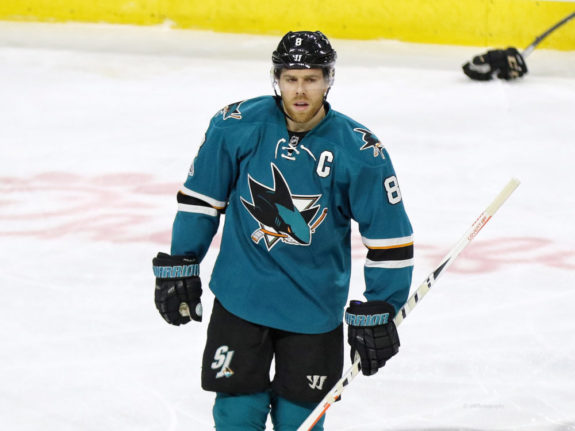
It comes down to Anaheim figuring out they’ll need to beat the Sharks by playing hard, heavy hockey. It requires more emphasis on the playing hockey part and less on trying to intimidate the Sharks. The Sharks have refused to play down to the Ducks’ level. It won’t be easy for Anaheim to adjust their mindset. They have the talent to succeed. Whether they have the mental game is an open issue.
For the Sharks, they need to continue doing what they have been doing. First and foremost, this means staying mentally strong. The Ducks don’t make it easy, but the 2-0 series lead tells the Sharks they’ve got the right strategy. Still, it bears reminding everyone, the Ducks have come back from 0-2 deficits in each of the past two postseasons – once to win a series, another time to take the lead in a series.
The Sharks Formula
Anaheim has been dangerous on occasion, but not as often as one would expect. The Ducks sole even strength goal didn’t come on a dangerous play, but on a long-range shot which fooled Jones.
The Sharks formula, as it’s been all season, is good goaltending behind a committed defense coupled with solid puck possession. It is exactly what worked against Anaheim in the first two games, with one addition. Against the Ducks, the formula requires poise, too. As long as only one team has it, only one team is going to succeed.
Zeke’s Notes
• One of the more interesting calls Sharks head coach Peter DeBoer made at the start of the series was to go with Sorensen on the fourth line. Sorensen had a so-so regular season and, as mentioned earlier, he’s the smallest player on the roster. This might not seem a good fit in games against the heavy Ducks, but he’s proven a matchup challenge. Give DeBoer credit for using the right guy in this matchup.
• When Joe Thornton went down, Joe Pavelski returned to center. And he’s been showing everyone why the move over to Thornton’s wing in the 2013-14 season might not have been the best idea. Sure, Pavelski averaged 36 goals a season for the four-year span. When you play on Thornton’s wing, you get to score goals. From Patrick Marleau to Jonathan Cheechoo to Devin Setoguchi, it’s a goal scorer’s paradise. Pavelski obliged, becoming one of the league’s top goal scoring wingers.
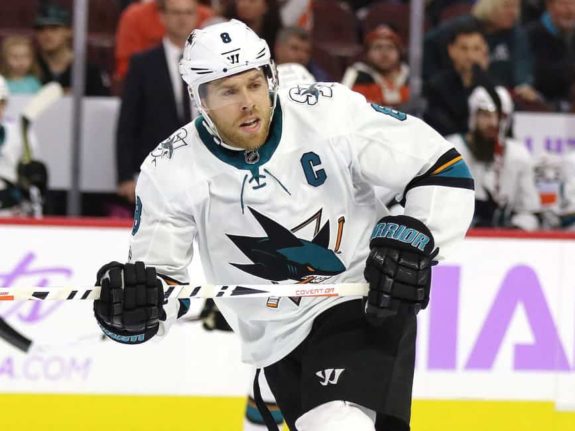
But Pavelski is a natural center and superb set-up man. Since returning to center on Jan. 25, Pavelski is plus-11 with 12 goals and 23 assists in 37 games. It’ll be tempting to return Pavelski to Thornton’s wing once the big guy returns. But DeBoer would be wise to recognize Pavelski is right where he belongs, and instead allow Thornton to carve out a new role.
• The Sharks AHL team, the San Jose Barracuda went to the final four last season in the hunt for the Calder Cup. Alas, this season was pretty grim. The Sharks raided the team, leaving the cupboards pretty barren. With six games left in their season, the Barracuda sat 10 points out of a playoff spot. File this one in the category stranger things. The Barracuda won out and the team they needed to catch hit a dry spell and well, the Barracuda are returning to the playoffs. This is not a contender like last season’s team, but playoff experience is welcome for this very young team.
• The flip side of the Barracuda’s surprise is the failure of the Ducks AHL team, the San Diego Gulls. The Barracuda passed the Gulls to make the playoffs. It is unlikely the Ducks bring someone up from the Gulls to play against the Sharks, it’s an option.